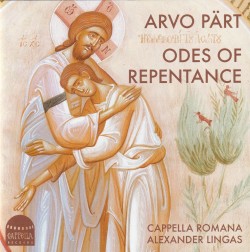 Arvo Pärt – Odes of Repentance
Arvo Pärt – Odes of Repentance
Cappella Romana; Alexander Lingas
Cappella Records CR428 (cappellarecords.com)
Esteemed senior Estonian composer Arvo Pärt’s current idiomatic musical style is rooted in Gregorian chant and later European polyphonic liturgical music, yet his early career compositional language embraced 20th century serialism and then minimalism. In addition, his use of Christian liturgical texts triggered censure from Soviet cultural authorities in the 1960s, leading to a personal reckoning. After years of personal renunciation, Pärt emerged in the 1970s with a new compositional style he dubbed “tintinnabula.”
In an unexpected twist of history, his often austere, meditative, faith-based music has found a wide audience in the decades since. He’s frequently ranked among the world’s most performed composers, particularly of choral music. And that’s what we hear on the Odes of Repentance album: a prayerful suite of choral works over 12 tracks. The selections were compiled by Alexander Lingas the music director of Portland Oregon’s Cappella Romana, a professional mixed choir known for its rigorous historically-informed performances of Orthodox church music. For example, Cappella Romana hired an Old Church Slavonic coach to aid in pronouncing that language for these performances.
Cappella Romana is an ideal match for Pärt’s sacred music. For example, The Woman with the Alabaster Box is a Gospel reading; there are also Orthodox hymns, heartfelt prayers and psalmody, all capped by Prayer after the Kanon. The album feels like a timeless liturgical service, the elegant leanness of its musical language kept in aesthetic tension and given additional meaning by the ritual lyrics and frequent short pauses for silent reflection.



